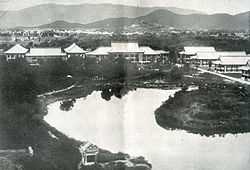Yenching University
| Yenching University | |
|---|---|
| 燕京大學 | |
 | |
| Motto | 因真理 得自由 以服務 |
Motto in English | Freedom Through Truth For Service |
| Established | 1919 |
| Location | Peiping, China |
Chinese Infobox:
| Yenching University | |||||||||||||
| Traditional Chinese | 燕京大學 | ||||||||||||
|---|---|---|---|---|---|---|---|---|---|---|---|---|---|
| |||||||||||||

Yenching University (simplified Chinese: 燕京大学; traditional Chinese: 燕京大學; pinyin: Yānjīng Dàxué), was a university in Peiping, China. It integrated three Christian colleges in the city in 1919. Yenching is an alternative name of old Beijing derived from its status as capital of Yan state, one of the seven Warring States that existed until the 3rd century BC.
History
The university was originally founded under the name Huiwen University. In its early years, it was in a chaotic situation, due to its financing by several churches:
- Huiwen University (滙文大學) was founded by the Methodist Episcopal Church (美以美會) in 1889. Its precursor was (崇內懷理書院) founded in 1870. Hiram Harrison Lowry was its principal.
- North China Harmony Women's University (華北協和女子大學). Its precursor (貝滿女塾) was founded in 1864.
- Tongzhou Harmony University (通州協和大學). Its precursor (公理會潞河書院) was founded by the Congregational Church. Devello Z. Sheffield was the school's principal.
John Leighton Stuart was appointed as the principal of the university in January 1919 when he taught Greek in Nanking Theological Seminary (金陵神學院), a seminary in Nanjing. Being short of capital at the beginning, he turned to fundraising worldwide and received support from the estate of Charles Martin Hall, an American executive of Alcoa Aluminum. He bought the royal gardens of a Qing Dynasty prince to build a scenic campus and employed gardeners from the Imperial gardens. In 1926 the campus was completed. Theology, Law and Medical were the main schools in the university, with Arts and Science studies.
Stuart attracted major Chinese and Western scholars to teach. Religion was not a qualification, although Stuart gave major support to the School of Theology. Among the first was William Hung, who became Chairman of the History Department and Dean. In 1928 the Harvard-Yenching Institute, was jointly founded by Yenching University and Harvard University for the teaching of the humanities and social sciences in East Asia. Under Hung, the university's reputation for Chinese studies steadily rose, especially with the publication of the Harvard-Yenching Sinological Index Series. Also in 1928, American journalist and educator Walter Williams established a department of journalism.[1] By 1930, the school was among the top universities in China, its teaching distinguished itself by a considerable academic freedom.
During the Second Sino-Japanese War, Peiping was occupied by Japan and the university was moved to Chengdu in Sichuan. After the People's Republic of China was established in 1949, Yenching University with its Christian background was closed. In 1952 its some arts and science teachers were shifted into Peking University and other institutions, its engineering section was merged with Tsinghua University, and Peking University obtained the Yenching campus. In 1952 Peking University moved from central downtown Beijing to the previous Yenching campus in the city's Haidian District.
Scholars
Among the scholars who taught at Yenching University were:
- Bing Xin (Xie Wanying) writer
- John Stuart Burgess (sociologist)
- Kenneth K.S. Chen (historian of Buddhism)
- Zhang Dongsun (Philosopher)
- K. C. Hsiao (political scientist)
- William Hung (sinologist)
- Lu Zhiwei (theologian)
- Wu Wenzao (sociologist)
- Qian Mu (historian)
- Wu Leichuan (theology)
- Zhao Zichen (theology)
- Edgar Snow (journalism)
- Louis Rhys Oxley Bevan (Law)
Alumni
Prominent alumni include:
- Fei Xiaotong (anthropologist)
- Han Suyin (author)
- Huang Hua (diplomat)
- Teng Ssu-yu (historian)
See also
- History of Beijing
- Michael Lindsay, 2nd Baron Lindsay of Birker and Hsiao Li Lindsay, Baroness Lindsay of Birker
Notes
- ↑ "Walter Williams" 2008 Missouri School of Journalism Centennial and Dedication, retrieved March 25, 2011.
References
- West, Phillip Yenching University and Sino-Western Relations, 1916-1952 (Cambridge: Harvard University Press, 1976).
- Arthur Lewis Rosenbaum. ed., New Perspectives on Yenching University, 1916-1952 : A Liberal Education for a New China. (Chicago: Imprint Publications, 2012). ISBN 1879176483. Some of the essays were first published in Journal of American-East Asian Relations 14: 1-4 (2004-2006).
External links
- Internet Mission Photography Archive (enter "Yenching University in Search Box)
- Photos at the International Mission Photography Archive